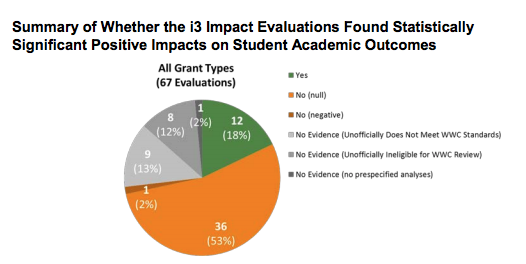The ‘dirty secret’ about educational innovation
A 2018 federal report found that only 18 percent of the innovations funded by the Education Department lifted student achievement
As part of the federal recovery effort to boost the economy after the 2008 recession, the U.S. Education Department suddenly had a big pot of money to give away to “innovations” in education. Since then, more than $1.5 billion has been spent on almost 200 ideas because Congress continued to appropriate funds even after the recession ended. Big chunks went to building new KIPP charter schools and training thousands of new Teach for America recruits to become teachers. Other funds made it possible for lesser known programs in reading, writing, math and science instruction to reach classrooms around the country. Many of the grant projects involved technology, sometimes delivering lessons or material over the internet. One “innovation” was to help teachers select good apps for their students. Another was for a novel way to evaluate teachers.
In order to obtain the grants, recipients had to determine if their ideas were effective by tracking test scores. Results are in for the first wave of 67 programs, representing roughly $700 million of the innovation grants and it doesn’t look promising.
Only 12 of the 67 innovations, or 18 percent, were found to have any positive impact on student achievement, according to a report published earlier in 2018. Some of these positive impacts were very tiny but as long as the students who received the “innovative treatment” posted larger test score gains than a comparison group of students who were taught as usual, it counted.
“It’s only a handful,” said Barbara Goodson, a researcher at Abt Associates Inc., a research and consulting firm that was hired to analyze the results of the Investing in Innovation (i3) Fund for the Department of Education. “It’s discouraging to everybody. We are desperate to find what works. Here was a program that was supposed to identify promising models. People are disappointed that we didn’t CONTINUE READING: The 'dirty secret' about educational innovation - The Hechinger Report


